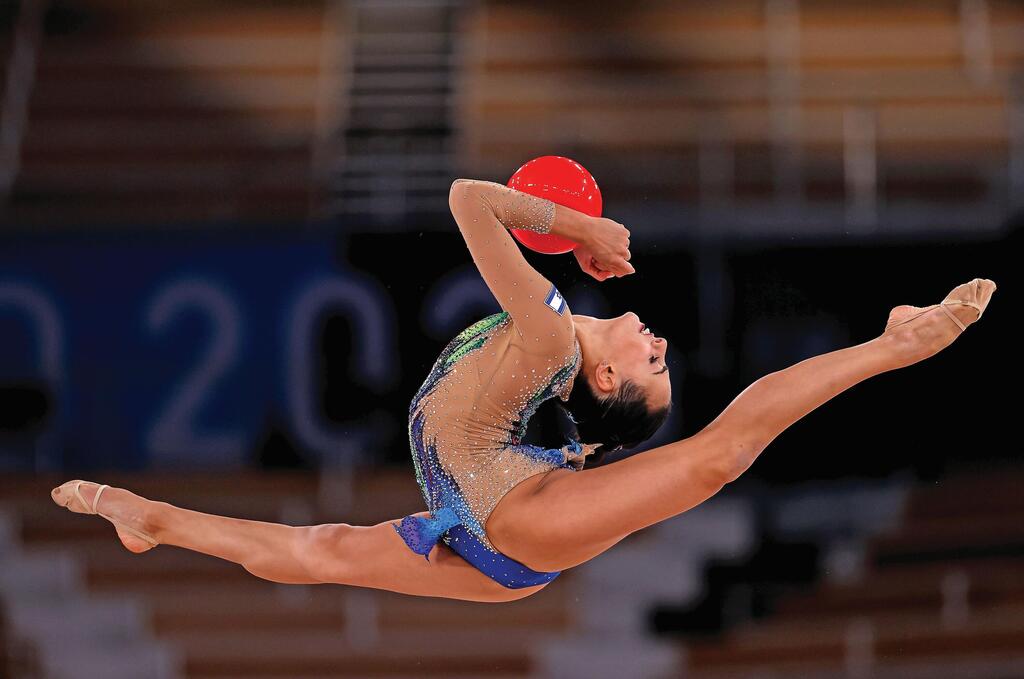Ever since her retirement from gymnastics earlier this year, Linoy Ashram took up tennis. She trains at Wingate Institute, where she also resides. One night she was playing with a friend when someone recognized her.
"This one guy stood there and looked at me," she recalls. "he stared and stared, and then suddenly asked, 'aren't you that gymnastics champion? I didn't recognize you. What happened to you? Why do you look like that? You're huge. You don't look beautiful like that.'
I asked him, 'what do you want?', and he replied, 'nothing, just for you to take care of yourself, go back to what you used to be.' "
What did you say?
"I just took my things and left. Why would I get into an argument with this kind of person?"
Some people just have no filters.
"He can think whatever he wants, but why are you saying this to me? I'm a pretty strong person mentally so I can handle it, but there are girls who would have a really hard time with that kind of remarks. Why behave like this? I like myself the way I am. What's it to you?"
Was it an unusual comment you got, or were there others?
"I get my fair share of negative comments about how I look now. People can come up to me in the street and ask me why I look like that and where is the old me. It's one thing when it's in text, but some just come up to me and say it to my face."
People consider you a national asset.
She laughs. "People genuinely think I went through my career for them, that I trained for hours every day since I was seven and competed in tournaments since I was 12, got injured and recovered - all for them. Absolutely not. I did it, first and foremost, for me, and then for Ayelet (Zusman, her trainer) and then for the country as well. But some take it very personally."
Fifteen months out from her historic gold medal triumph at the Tokyo Olympics, and people on the street still want to touch her, all the time and everywhere. She avoids reading talkbacks about her weight and has no intention to apologize for gaining 12 kilograms (26 pounds).
"I wasn't waiting to gain weight," she says. "I just knew that will happen. Every gymnast gets this sudden 'boom' and gains weight rapidly, but it's still important to me to take good care of myself. I'd like to shed about 2 kilograms and then stay that way. I maintain a healthy lifestyle, work out and also help and demonstrate moves when I teach."
Happy with retirement
In early April, Ashram called a press conference where she tearfully announced her retirement. "That's when it dawned on me. That I was done."
Many elite athletes report periods of depression after retirement and have difficulty adjusting to their new lives, but not Ashram. "I wasn't depressed because I quickly entered a new world. Just two months after the Olympics I started studying at Wingate Institute and coaching, and I traveled to competitions abroad as a trainer. Just a lot of things to do."
Didn't you want to take a year off to travel?
"No. Why waste time? I definitely won't work an office job. I can't. I'm too hyperactive."
Seven months later, do you miss the action and competitions?
"I miss competitions a lot. I prefer competing over training. A few months ago, when I flew abroad with the young gymnasts as a trainer, I wanted to step out on the mat in their place. When I saw gymnast Daria Atamanov compete, I thought to myself, 'it should have been me'," she laughs. "I'm happy with my decision to retire, but miss the adrenaline."
What do you attribute your success to?
"Success is not about talent at all. I had almost none of it as a gymnast. It was 90% hard work. Having a strong character is immensely important. When I first started, no trainer thought I'd amount to anything. With time, many gymnasts retired and I kept on climbing. Many gymnasts who excel when they're young can't handle the stress of competing at the adult level. Exercises and moves require more agility and strength and many falter. I always had a passion for winning and just knew I'd get to the Olympics."
How much did you suffer from the strict diet that was demanded of you?
"I can't say I've had no sweets since I was seven. There were some mishaps. Like sometimes during Kiddush when my parents had a really delicious cake. I waited until no one was around and raided the fridge," she laughs. "You can't avoid it completely. I'd eat and then go on a run. The thing about keeping our body weight low was strictly about protecting us from injury. The more I weigh, the greater the load on my legs. Of course, appearance is also important."
Someone to run with
Ashram was one of the first gymnasts to bust the myth about having a romantic life on the road to the medal. Nine months ago, she broke up with her boyfriend of two and a half years, an IDF officer called Ofek.
Are you ready for new love?
"I think so. No dates yet. I don't go out to pubs because that's not where you go for a relationship, but something casual, and I'm a relationship type of woman. I also don't want to date someone who is with me because I am 'the Linoy Ashram'. That's why I'm not on dating websites or Instagram. I'll probably meet someone in college or through friends."
Do you reply to suitors?
"I read their messages but don't always reply. It's scary. I prefer meeting a partner in other ways and not through Instagram."
Who would make a good match for you?
"He doesn't have to be a pro athlete, but it'd be nice if he maintained a healthy lifestyle and have ambitions. I love jogging on the beach but it's no fun running by myself. I would be happy if my future partner would go out jogging with me from time to time."
Ashram is in her second year of studying toward a bachelor's in physical education at the Academic College at Wingate. She studies and lives there on a full-ride scholarship.
Ashram is one of three coaches that are set to lead the next generation of gymnasts, alongside Ella Samofalov and Zusman who coached her. To that end, she shows up several times a week at "the tent", Wingate's massive gymnasium.
Once a week, she also coaches young girls at Hapoel Rishon Lezion where she grew up. In the evening, she rests or gives lectures.
Ashram also has sponsorship deals with Adidas, menstrual hygiene products brand Always and breakfast cereal brand Telma. She also found a new direction: she will appear at the upcoming Festigal — the popular annual Israeli song and dance musical show for children — where she will be portraying a superhero version of herself.
You didn't have time for Festigal as a kid.
"True, but I can't say I didn't have a childhood. I felt special, doing things other girls could not. When I was 12, I quit, I wanted to be a normal girl. After a month, I started crying and went back."
How are you preparing your body for the Festigal rehearsals coming up?
"I exercise. My body is used to a certain level of intensity so I maintain it. Going cold turkey would be very bad. I've had meniscus tears in both knees. I had surgery on my right knee in 2017. Plus, I've had a tear in my thigh joint for eight years now. When I competed, it hurt like hell and I'd take painkillers. I avoid surgery because it doesn't bother me day-to-day, except a little when I walked a lot in London recently."
So you won the medal injured?
"Every gymnast is injured in one way or another. If she isn't, she's not working hard enough."




